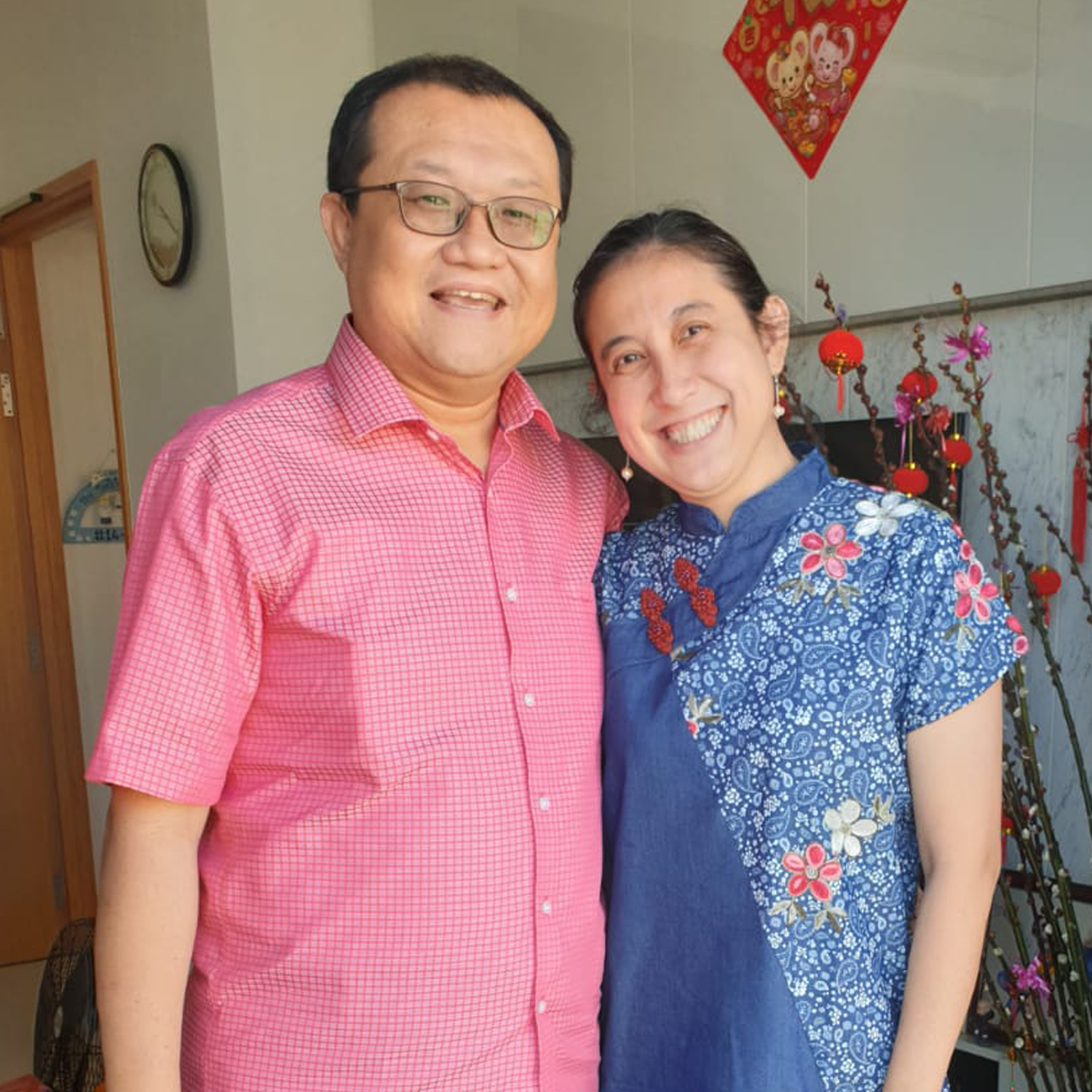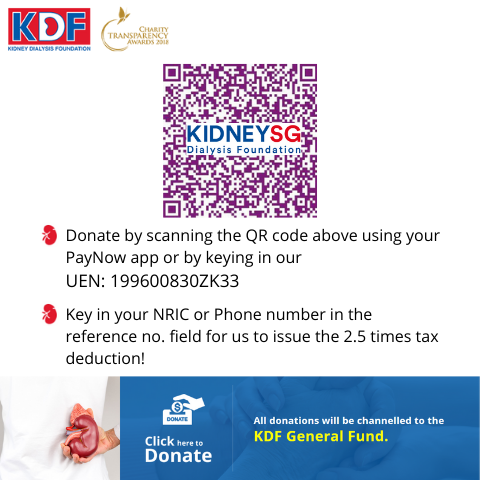Our Patients
Posted on 29.7.2022 | 12:00 AM
Dancing Through Life With Louis
Dancing Through Life with Louis
By Beryl Leong
KDF patient Louis Chia, 50, believes in lending a helping hand to the greater community through a unique role – as a freelance pallbearer for a bereavement services company.
In this special issue of KDF Link, we sat down and had a chat with Louis to better understand his challenges as a kidney patient, his unique choice of work, and about his motivations in life.
How did you react to your diagnosis?
When I was in my late twenties, I was diagnosed with diabetes. This affected my kidneys, and I only had about 25% of kidney functions left then. Due to my health condition, I was subjected to regular health reviews every year for the next 10 years or so. In 2017, my doctor found that my kidney readings had deteriorated further - below 10%! I was asked to undergo dialysis after. It was not surprising for me.
Back then, I was quite sure that I did not want dialysis because it was inconvenient and expensive. I even remember asking the doctor, “How long do I have to live if I don’t go through dialysis? I don’t print money you know.” Turns out you can stay alive for 2 weeks without treatment, and I figured 2 weeks was enough for me. My wife and mother were extremely upset with my decision, and they tried to convince me to reverse the decision. In the end, I gostan[1] my decision lah, and agreed to start dialysis.
I was receiving treatment from a private service provider, and it was putting a toll on my family’s finances. My mother-in-law is also a dialysis patient, and my wife was struggling to afford our treatments. I was finally transferred out and was accepted into KDF. It really lifted the financial burdens from her.
How did life change as a kidney patient?
Shortly after my diagnosis, my father was stricken with end-stage cancer. Prior to that, I was working as a full-time sales manager in the building materials industry for more than 10 years. I made the decision to quit my job and be my father’s primary caregiver.
On top of caring for my dad, I had to work around diet restrictions and loss of strength. Dialysis was exhausting, and I was always weak after each session. My schedule is now fixed, I had to control my liquid intake, I can’t eat many foods that I used to enjoy. I had to make peace with a lot of discontent. Dad fought the good fight and passed away 2 months later.
In 2018, I underwent a heart bypass procedure, and my physical health went downhill. I could no longer walk long distances without feeling breathless, and it was normal for me to pass out from tiredness for long hours on the bed after dialysis.
It was sad that I could not be my normal self. I was only 46, but my body felt like an old man. I used to be a workaholic – I would drop everything for work. Now, I am too weak to manage a full-time job, and my wife had to take on the role of the sole breadwinner of the household. But I’m thankful for KDF’s assistance, and the staff and patients, many who are now my good friends. In a way, this disease forced me to slow down and focus more on my wellbeing - bit of a blessing in disguise lah.
You were only 45 when diagnosed. Were your family members open to explore organ donation?
My doctor did mention that I was considered young for a kidney patient. My wife actively considered donating her kidney to me. However, after a series of reviews and check-ups, we were not able to proceed as her family has a history of kidney-related diseases. My mother-in-law is also a dialysis patient for the past decade, so my wife is not a suitable donor.
My mother has tried broaching this topic with my five siblings. It’s easy to get help from my siblings, both financially and mentally. But to ask either of them to donate a kidney to me, it’s a huge, life-changing decision for them to make.
My family has been rather conservative about it, and matters have remained status quo. Ever since I had my heart bypass procedure, I am now no longer able to put my name on the public kidney transplant waiting list. Of course, I have my regrets, but it is too late to change anything now.
How were you introduced to the bereavement care industry?
When my father passed away, I had the help of a group of friends in church to assist with the funeral. Soon after, they reached out to me and said, “Louis, you’re not working at the moment. Would you like to help as a pallbearer in the bereavement services industry?” I just thought, this sounds easy enough and I can earn some pocket money out of it as well, I agreed.
How did your family react to your decision to be a pallbearer?
*laughs* My father’s side of the family were puzzled when they found out about my new ‘gig’. You know how superstitious older folks can be. They were telling me, “Louis, why did you choose such a job? Why put yourself in such a position? You can work for the living, why work for the dead?”
Being in bereavement care is a proper job, no matter what your role is. I’ve been a freelance pallbearer for Dignity Bereavement Services for a while now. I don’t rob, I try my best to make an earnest living, and it’s meaningful. I am also in a direct position to help those in need, so why not make the best out of it?
My wife has been extremely supportive of my job. She tells me all the time – “If you enjoy this, keep doing it.” Due to my health conditions, some of the blood vessels at the back of my eyes are damaged. I experience severe vision floaters, making it difficult for me to see or work at night. So, If I take on any work engagements in the evening, my wife never fails to come by after her work to help me. I am extremely lucky to have her by my side.
Do you have any interesting work anecdotes?
The rule of thumb working in an afterlife services company is to never turn a grieving family away. We once received a referral from a family who had budget constraints. Regardless, the team went the extra mile and agreed to take on the engagement. They did their best to ensure that the deceased was able to get a dignified send-off.
At the wake, I realised that they were family friends. I guess that was a divine sign, that I was meant to be in this industry. *laughs* Even when I feel tired after dialysis, to the point that I find it difficult to walk, when a phone call comes in and I have another family to serve, somehow without fail, I am able to find a renewed sense of energy to accept the case and comfort the grieving family.
It’s normal to face emotional family members in this line of work. Usually, words fail to provide the comfort that they need. What we can do is to show it through our bereavement services, and let our physical presence be a source of solace for the family during this difficult time
When I am able to provide proper closure for the deceased and their loved ones, it really shows on the faces of the family members, and that gives me a sense of satisfaction. Some of them are now my friends, and they call in to check in on me every now and then. It makes me want to continue what I feel I was meant to do.
You are one of the few KDF patients that have some form of work engagement. Did you face any the challenges along the way?
Of course. I have faced employers who have asked me to leave with no valid reason, after I was upfront with that that I am a kidney patient. But we can’t fully blame them. As a kidney patient undergoing haemodialysis, I can’t work a regular 9 to 5 job for five days a week because 3 days would be for dialysis. Health scares can happen too. That’s the reality of being a kidney patient.
The gig economy has been quite forgiving to us since flexibility is important. Some of us can even be private hire drivers now. More can be done to remove the social stigma of being a kidney patient. A little bit of understanding goes a long way. Earning your own keep, no matter how much or how little, can really empower us.
Any advice for fellow kidney patients?
It’s okay to be angry or upset in the initial stages of diagnosis, but don’t let it consume you. It is important to come to acceptance in the end. Everything happens for a reason, and it is on you to make the best out of the situation. Dialysis can add years to your life, but what you do with your added years is what matters more.
Spend time with your loved ones, do some volunteer work, help a family in need. In fact, after this I’m going to slowly make my way to pick my wife up from work. Make every waking moment count.
[1] Singlish for reverse


